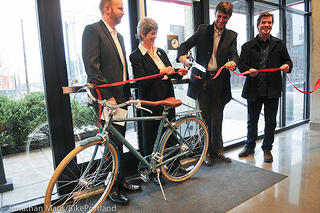
Carlotta Collette, and real estate developers Phil
Morford and Konstantin Klebleev cut the ribbon
on the new Milano apartments today.
(Photos © J. Maus/BikePortland)
The ribbon was cut at the new Milano apartments in the Lloyd Center this morning. As people streamed by the newly painted bike lanes on NE Multnomah Street behind them, Metro Councilor Carlotta Collette stood behind a shiny new city bike with the building’s architect Murray Jenkins and developers Phil Morford and Konstantin Klebleev.
On a table in the lobby a brochure enticed would-be buyers to, “Live in Portland’s first thoroughly bike friendly community… Not only is the Milano located with immediate access to public transportation — including the MAX line, Portland streetcar, and TriMet — it’s also at the hub of the city’s cycling lanes.”
According to developer Phil Morford, the entire Milano project was conceived with a focus on being oriented toward the low-car and carfree lifestyle. “When we began to design this project,” Morford said at the grand opening event today, “Our first discussion was with Metro.” As the quintessential “transit-oriented development,” the development of the Milano was aided by a $300,000 Metro grant which leveraged over $13 million in private investment.
While transit was a key to funding the development, it’s the appeal of bicycling that is at the center of the building’s marketing campaign. Asked when we’ll ever see bike-oriented development funding, Metro’s Collette said, “TOD starts with the transit funding stream. Finding the dollars for bicycle specific projects is trickier.” In other words, TOD funds — which are doled out based on a formula of how many new transit riders a development might create — exist because there is a big pot of federal dollars already set-aside for transit. The same pot of money, nor a formula like that, exists for bicycling.

The Milano’s niche is close-in, affordable, workforce housing that caters to bicycle and transit users who don’t own a car. And it would be hard to find a better location. “The goal was to get close to the action, and you cant get more close than here,” commented architect Murray Jenkins as he rattled off all the nearby non-car travel options. The Milano is mere steps away from MAX, bus, bikeways, and even the new eastside streetcar line. At today’s opening celebration, Car2Go reps had a table in the bike parking room.
Units (there are 60 total) at the Milano are small and range in price from $895 for a studio to $1,250 for a one-bedroom. One of the big ways Milano tenants will save money is by not driving. There are only 12 auto parking spaces for the entire building and a permit to park in one of them costs $150 a month. On the other hand, the bike parking is plentiful and it’s absolutely free.
The indoor bike parking at the Milano boasts room for 91 bicycles. It is located directly adjacent to the main lobby (not in a back room) and it has two access doors: one from outside and one leading into the lobby. It is also secured with a key-fob entry (only tenants with bicycles have access) and a security camera. There’s even a repair stand, a pump and some tools.
Phil Morford with Civitas, a real estate development company, said it was his firm that put the bicycle at the center of the building’s marketing push. “We knew it would be near transit, so we didn’t need to make room for as many cars. The bike thing happened almost by default.” The new road diet and redesign of NE Multnomah Street that comes right to Milano’s front door happened after the project had already begun. “That was serendiptous,” Morford said with a big grin, “I think [riding on it] is great. It’s a much safer environment.”
As for the “apartments with no parking” debate, Morford doesn’t see what the big deal is. “If your building is well-served with transit and bike lanes, I don’t see a problem with parking at all.” So far, less than half of the Milano tenants own cars.
And if all goes well, this isn’t the last transit and bike-oriented project we’ll see from these developers. “We’ve already had a huge response from people,” said Phil Horford, “And we want to do this in other places.”
CORRECTION: I initially reported that $300,000 in Metro funds leveraged $13.1 million in federal TOD funding. That was wrong. The correct information is that the Metro funds leveraged $13.1 million in private investment. I regret the error — Jonathan







